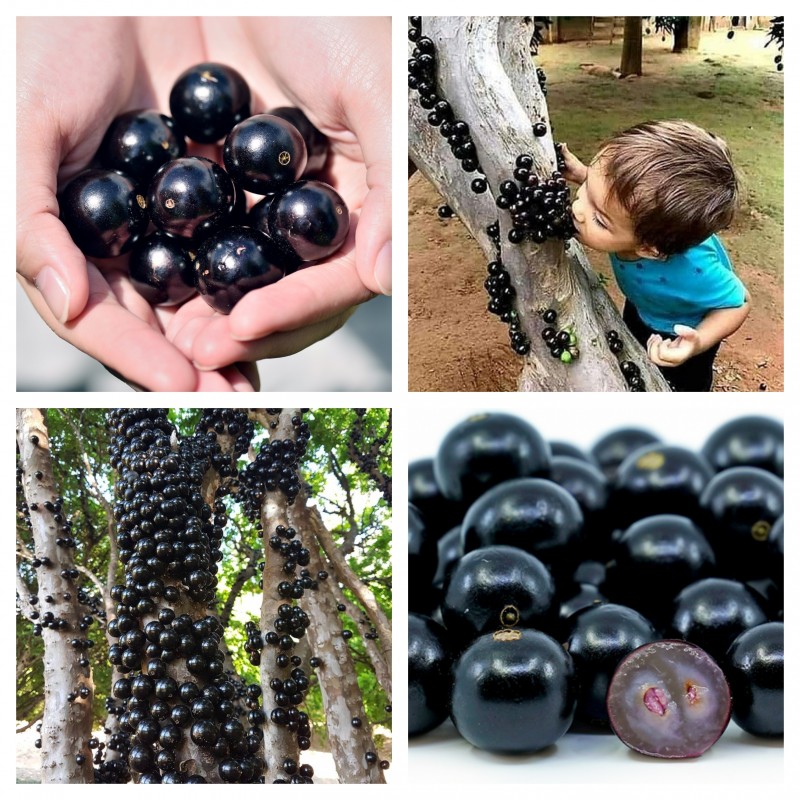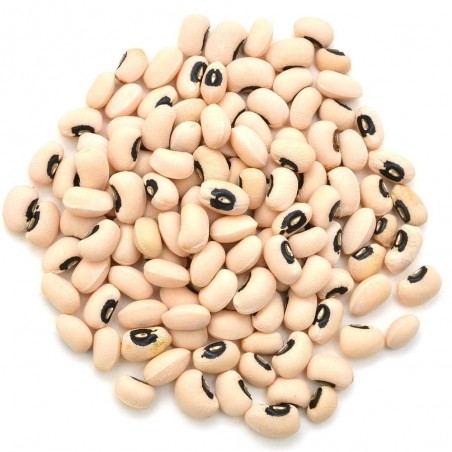
Brazilian Grapetree, Jabuticaba Seeds (Plinia cauliflora)
Brazilian Grapetree or Jabuticaba Seeds
Price for Package of 2 seeds.
Other common names include Brazilian Grape Tree, Jaboticaba, Jabotica, Jabuticabeira, Guaperu, Guapuru, Hivapuru, Sabará and Yvapuru (Guarani).
Jabuticaba (Plinia cauliflora) is the fruit of the Jabuticabeira tree in the family Myrtaceae native to Minas Gerais and Sao Paulo states in southeastern Brazil. Related species in the genus Myrciaria, often referred to by the same common name, are native to Brazil, Argentina, Paraguay, Peru, and Bolivia. The tree is grown for its purplish-black, white-pulped fruits; they can be eaten raw or be used to make jellies and drinks (plain juice or wine).
The tree is a slow-growing evergreen. It has salmon-colored leaves when they are young, which turn green as they mature. The tree prefers moist, rich, slightly acidic soil. It is widely adaptable, however, and grows satisfactorily even on alkaline beach-sand type soils, so long as they are tended and irrigated. Its flowers are white and grow directly from its trunk in a cauliflorous habit. In an uncultivated state, the tree may flower and fruit only once or twice a year, but when continuously irrigated it flowers frequently, and fresh fruit can be available year-round in tropical regions.
The fruit is a thick-skinned berry and typically measures 3–4 cm in diameter. The fruit resembles that of a slip-skin grape. It has a thick, purple, astringent skin that encases a sweet, white or rosy pink gelatinous flesh. Embedded within the flesh are one to four large seeds, which vary in shape depending on the species. Common in Brazilian markets, jabuticabas are largely eaten fresh; their popularity has been likened to that of grapes in the United States. Fresh fruit may begin to ferment 3 to 4 days after harvest, so they are often used to make jams, tarts, strong wines, and liqueurs. Due to the extremely short shelf-life, fresh jabuticaba fruit is very rare in markets outside of areas of cultivation. Traditionally, an astringent decoction of the sun-dried skins has been used as a treatment for hemoptysis, asthma, diarrhea, and gargled for chronic inflammation of the tonsils.
Several potent antioxidants and anti-inflammatory anti-cancer compounds have been isolated from the fruit. One that is unique to the fruit is jaboticabin.
In Brazil, the fruit of several related species, namely Myrciaria tenella and M. trunciflora, share the same common name. While all jabuticaba species are subtropical and can tolerate mild, brief frosts, some species may be marginally more cold-tolerant. Commercial cultivation of the fruit in the Northern Hemisphere is more restricted by extremely slow growth and the short shelf-life of fruit than by temperature requirements. Grafted plants may bear fruit in 5 years; seed grown trees may take 10 to 20 years to bear fruit, though their slow growth and small size when immature make them popular as bonsai or container ornamental plants in temperate regions. Jabuticabas are fairly adaptable to various kinds of growing conditions, tolerating sand or rich topsoil. They are intolerant of salty soils or salt spray. They are tolerant of mild drought, though fruit production may be reduced, and irrigation will be required in extended or severe droughts.
The name jabuticaba, derived from the Tupi word Jabuti (tortoise) + Caba (place), meaning the place where you find tortoises. The Guarani name is "Yvapuru", where yva means fruit, and the onomatopoeic word puru for the crunching sound the fruit produces when bitten.
A traditional song from the eastern region of Bolivia refers to a young woman as having "eyes like the guapuru" (because of their soft blackness) and a mouth "as sweet as the achachairu."
The jabuticaba tree, which appears as a charge on the coat of arms of Contagem, Minas Gerais, Brazil, has become a widely used species in the art of bonsai, particularly in Taiwan and parts of the Caribbean.
| Sowing Instructions | |
|---|---|
| Pretreatment: | Soak in warm water for 24 h |
| Stratification: | x |
| Sowing Time: | all year round |
| Sowing Depth: | 0,5 - 1 cm |
| Sowing Mix: | Coir or sowing mix + sand or perlite |
| Germination temperature: | min. 20 ° C |
| Light or dark germination: | dark |
| Organic Seeds ? | Organic Seeds |
|---|---|
| Organic/natural ? | Organic/Natural: Yes |
| Edible ? | Edible |
| Pretreatment of sowing ? | Soak in water before sowing 12-24 h |
| Sowing depth ? | Sowing depth 1 cm |
| Semințe culese manual? | Semințe culese manual |
| Suitable for growing in flower pot ? | Suitable for pot: Yes |
| Medicinal Plant ? | Medicinal Plant: Yes |


Aprecierea ta pentru recenzie nu a putut fi trimisa
Reclama un comentariu
Raport trimis
Reclamatia tau nu a putut fi trimisa
Scrie-ti recenzia
Recenzia a fost trimisa
Recenzia ta nu a putut fi trimisa
🌍 Livrare Globală din UE
Expediem comenzi la nivel mondial din Uniunea Europeană prin poștă înregistrată cu confirmare de primire.
📦 Urmărirea coletului
Pentru a urmări coletul, autentifică-te în contul tău și accesează secțiunea Istoricul comenzilor > Detalii. Acolo vei găsi numărul de urmărire.
Urmărire internațională: 17Track
Pentru numere de tip RGxxxxxxHR: Posta.hr Tracking
🕒 Notă: Informațiile de urmărire devin disponibile după cel puțin 24 de ore de la expediere.
⚠️ Informații importante
Plata ramburs nu este disponibilă.
Verifică dosarul SPAM / Junk al e-mailului pentru a nu rata notificările.
Contactează-ne doar prin formularul de contact de pe site.
E-mailurile directe nu vor fi procesate.
📱 Număr de telefon obligatoriu
La plasarea comenzii, te rugăm să introduci numărul tău de telefon mobil cu prefixul internațional al țării.
Exemplu: +40 712 345 678
🚚 Condiții de livrare
Pentru coletele înregistrate, este necesară semnătura destinatarului.
Nu comanda dacă:
dorești ca pachetul să fie livrat într-o cutie poștală
nu vei fi acasă pentru a-l prelua
dorești ca pachetul să fie lăsat la un vecin (❌ acest lucru nu este posibil)
📬 Dacă oferi o adresă de tip cutie poștală și coletul se pierde, nu ai dreptul la ramburs.
↩️ Returnarea coletului și reexpediere
Dacă, din orice motiv, coletul este returnat către noi:
Vei fi responsabil pentru costul de retur de 2 €
Și pentru costul reexpedierii
⏱ Întârzieri și urmărire
Dacă urmărirea indică „la expeditor”, înseamnă că este în tranzit.
Contactează oficiul poștal local cu numărul de urmărire pentru informații actualizate.
Nu suntem serviciu poștal – nu putem urmări coletul în numele tău.
Nu ne asumăm responsabilitatea pentru timpii de livrare.
🔍 Putem începe o investigație doar după 30 de zile de la data expedierii.
✈️ Opțiuni de livrare
| Tip livrare | Timp procesare | Asigurare | Posibile întârzieri | Detalii |
|---|---|---|---|---|
| Standard | 7–10 zile lucrătoare | ❌ | 7–14 zile | Cea mai ieftină opțiune |
| Prioritară | 1–7 zile lucrătoare | ❌ | 3–10 zile | Comanda procesată prioritar, dar nu livrată mai rapid |
| Asigurată | 1–7 zile lucrătoare | ✅ | 3–10 zile | Rambursare garantată dacă coletul se pierde (până la 150 €) |
🕒 Timp estimativ de livrare:
În UE: 3–20 zile lucrătoare
Internațional: 5–30 zile lucrătoare
Exemple livrări SUA: 27, 22, 19, 17, 13 zile
💳 Metode de plată
💶 Transfer bancar (SEPA / IBAN / SWIFT-BIC)
În descrierea plății trebuie să menționezi codul comenzii (ex. SGS-19811702).
Dacă nu apare codul, comanda poate întârzia sau fi anulată.
Dacă plata nu este recepționată în 7 zile, comanda va fi anulată automat.
🅿️ PayPal
Acceptăm plăți doar în euro.
Te rugăm să selectezi euro în timpul procesului de plată.
💳 Card bancar
Plata se face pe site-ul nostru: Exotic Seeds Store
Acceptăm: Visa, MasterCard, American Express, Diners Club, Discover, JCB, UnionPay etc.
💡 Clientul suportă toate taxele de tranzacție.
Pentru procesare rapidă, trimite dovada plății.
📅 Observații suplimentare
Nu procesăm comenzi și nu expediem sâmbăta sau duminica.
Verifică întotdeauna anunțurile importante de pe site-ul nostru înainte de a plasa o comandă (ex. sărbători sau condiții speciale).
📫 Important:
Nu trimite mesaje pe adresa noastră de e-mail. Folosește exclusiv formularul de contact disponibil pe site-ul nostru.
Related Products



















